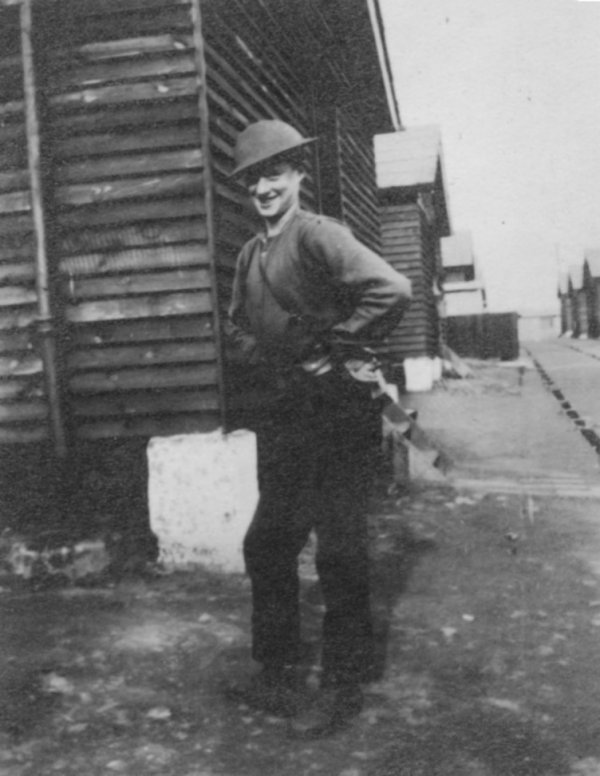Shot at Dawn
Private Harold George Carter the 13th of 25 Canadians Shot at Dawn during the Great War.

Enlistment of Private Harold George Carter
Private Harold George Carter 454482, son of George Harold and Milly Carter, 143 Cumberland Street, Toronto, Ontario. Born 26 March 1894 in Toronto, but birth record confirms the correct dob as 26 March 1896. Brother of Private Ernest Harold Carter 33034 serving with No 2 Canadian Field Ambulance.
Enlisted 22 February 1915, 59th Battalion (45th Victoria Regiment), Quebec He stood 5′ 6″ tall, 138 pounds, light complexion, blue eyes and brown hair. Certified by officer of commanding unit, Lt-Col Herbert John Dawson DSO & Bar on 6 July 1915.

While with 59th Battalion Private Harold George Carter spent most of his time in detention.
- 120 hours detention, July 1915.
- 13 days pay, 13 days detention, August 1915.
- 120 hours detention, September 1915.
- 90 days detention, October 1915.
Private Harold George Carter’s unit sailed for England on 1 April 1916 aboard SS OLYMPIC. Wrote his will and bequeathed everything to his mother on 8 September 1916 as he proceeded overseas with the 73rd Battalion. Entered France on 21 August 1916, in a few months, Pte Carter in trouble once again.
False Docket No. 306, File 648-C-11904
9 January 1917, When on Active Service, Deserting His Majesty’s Service.
Plea: not Guilty.
1st Witness Sgt Ernest William Hopkins 132028 gave evidence that on the night of 19 November 1916, Private Carter was absent from the trenches.

2nd Witness CSM J. McRaye reported Private Carter absent daily from 19 November to 7 December 1916.
3rd Witness Corporal Hansfield reported receiving Private Carter from a Sergeant of the A.P.M. on 7 December 1916. Carter placed in the Guard Room by the Sgt.-Major.
Defence
1st Witness Captain Haynes states the accused told him he had left his battalion on 19 November to see his brother in hospital at Bethune. Detained the night after his arrival in Bethune. Carter stated he was held there for five days, and transferred to another place he could not name.

His sentence commuted to 10 years’ imprisonment. After serving six months, his sentence suspended, and re-attached to his unit on 16 March 1917.
At the same time as his first FGCM, George’s brother Private Ernest Harold Carter of No 2 Cdn Fld Amb sentenced to 14 Days Field Punishment No 1 for overstaying leave in England by four days. Before his discharge in 1919, Ernest granted One Good Conduct Badge.
Battle of Vimy Ridge
Within three weeks, Carter once again went AWOL before the Battle of Vimy Ridge, eluding the MPs for five days before capture. Court-martialled and found guilty of desertion. Sentenced to death, Carter executed by firing squad on 20 April 1917.

Tried and convicted by Field General Court Martial on April 5, 1917 for ‘When on active service, deserting His Majesty’s service’. Executed by firing squad 20 April 1917. Harold’s brother Private Ernest Harold Carter stationed nearby at Ariane Dump during this time, just north-east of Maroeuil.
Villers Station Cemetery
Villers Station Cemetery, Villers-au-Bois begun by the French but used by Commonwealth divisions and field ambulances from the time they took over this part of the front in July 1916 until September 1918.

Associated particularly with the Canadian Corps whose headquarters nearby and many of the graves in Plots V to X date from April 1917 and the Battle of Vimy Ridge. A higher percentage of Canadian officer’s buried in Villers Station Cemetery, like it’s counterpart Lijssenthoek Military Cemetery in Belgium.

After the Armistice, a few graves brought in from isolated positions in the neighbourhood and in June 1923, most French graves removed, the great majority to Notre Dame-de-Lorette French National Cemetery. Some families declined to have their loved ones exhumed, as was their right.
Carter joined by Private Stephen McDermott Fowles in Villers Station Cemetery on 19 June 1918. Fowles the second to last Canadian soldier Shot at Dawn in the Great War.

Villers Station Cemetery now contains 1,208 Commonwealth burials of the Great War and 32 German war graves.
More
Please subscribe to CEFRG to be notified by email when there are new posts. Subscription is free, and your email kept confidential.
